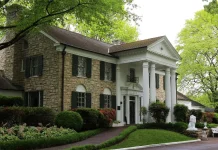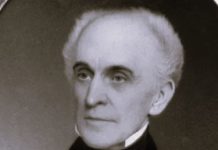Joseph Medill was an editor, newspaper publisher, and Republican Party politician. He was born April 6, 1823, near St. John, N.B., of Scotch-Irish parentage but distantly of Huguenot descent. At 9 years old, he accompanied his parents to Stark County, Ohio. There, he enjoyed the educational benefits associated with that region.
Thus, he entered an academic program to prepare for college, but his family suffered a fire, and he was compelled to turn his attention to business. He studied law, was admitted to the bar in 1846, and began practicing in New Philadelphia, in Tuscarawas County. During this time, Joseph Medill caught the spirit of journalism through frequent visits to a local paper’s office and learned to set type and work a hand press.
In 1849, Joseph Medill bought a paper in Coshocton, where he assumed editorial charge, employing his brothers as assistants in various capacities. The name of this paper was “The Coshocton Whig,” which he soon altered to “The Republican,” in which he dealt vital blows at political and other abuses, which several times brought assaults from his political opponents, which was the style of parliamentary argument in those days. After two years, he decided to sold out “The Republican,” and established “The Daily Forest City” in Cleveland—a Whig paper with free-soil proclivities.

The following year, “The Forest City” was consolidated with “The Free-Democrat,” a free-soil paper under the editorship of John C. Vaughan, a South Carolina abolitionist, the new paper taking the name “The Cleveland Leader.” Mr. Medill, with the cooperation of Mr. Vaughan, then went to work to secure the consolidation of the elements opposed to slavery in one compact organization.
Henceforth, in this he was aided by the introduction of the Kansas-Nebraska Bill in Congress in December 1853, and, before its passage in May following, Mr. Medill had begun to agitate the question of a union of all opposed to that measure in a new party under the name “Republican.” During the winter of 1854–55, he received a call from Gen. J. D. Webster, at that time part owner of “The Chicago Tribune,” which resulted in his visiting Chicago a few months later and his purchase of an interest in the paper, his connection with the concern dating from June 18, 1855.
Joseph Medill was shortly joined by Dr. Charles H. Ray, former editor of “The Galena Jeffersonian,” and later by J C Vaughan and Alfred Cowles, both former employees of “The Cleveland Leader.” Joseph Medill assumed the position of managing editor and, on the retirement of Dr. Ray in 1863, he became editor-in-chief until 1866, when he left his place to Horace White, now of “The New York Evening Post.”
During the Civil War period, he was a zealous supporter of President Lincoln’s emancipation policy and served, for a time, as President of the “Loyal League,” which proved such an influential factor in upholding the hands of the government during the darkest period of the rebellion. In 1869, Joseph Medill was elected to the State Constitutional Convention.
In that body, Joseph Medill was the leading advocate of the principle of “minority representation” in the election of representatives, as it was finally incorporated into the Constitution. In 1871, Joseph Medill was appointed by President Grant as a member of the first civil service commission, a key position for which he had always dreamed. He was elected mayor of Chicago a few weeks after the massive fire in the same year.
The city’s financial condition at the time and other questions and issues involved significant difficulties and responsibilities. He met in a way that commanded general approval. During his administration, the Chicago Public Library was established. Mr. Medill delivered the address at its opening on January 1, 1873.
Therefore, near the end of his mayor-ship, he eventually resigned and spent the following year in Europe. Almost simultaneously with his return from his European trip, he secured a controlling interest in “The Tribune,” regaining control of the paper on November 9, 1874. As editor-in-chief, he retained it for the remainder of his life, nearly twenty-five years.
Nevertheless, the growth of the newspaper in business and its influence, from the beginning of his connection with it, was one of the marvels of journalism. This made it easily one of the most successful newspaper ventures in the United States, if not in the world.
However, the early in December 1898, Mr. Medill traveled to San Antonio, Texas, hoping for relief in that mild climate from a chronic disease that had troubled him for years. Therefore, Joseph Medill died in that city on March 16, 1899, within three weeks of his 76th birthday. His character was marked by strong individuality and indomitable perseverance, which led him to never accept defeat.
A few weeks prior to his death, facts were developed to show that, in 1881, he was offered, by President Garfield, the position of Postmaster-General, which was declined when he was tendered the choice of any position in the Cabinet except two that had been previously promised; also, he was offered a position in President Harrison’s Cabinet in 1889.
Read More: Biography of Andrew Ryan McGill







